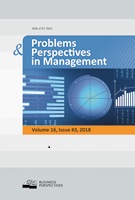Stakeholder engagement to replace traditional activities in Reputation Management System: insights from Ukrainian food processing companies
Stakeholder engagement to replace traditional activities in Reputation Management System: insights from Ukrainian food processing companies
Author(s): Olena DereviankoSubject(s): Economy, Business Economy / Management
Published by: ТОВ “Консалтингово-видавнича компанія “Ділові перспективи”
Keywords: indirect reputation management; managing corporate reputation; organizational preconditions; reputation; reputational risks;
Summary/Abstract: Engaging stakeholders in reputation management processes in the digital economy, including through the use of their activity on the Internet and social networks, is a way to reduce the irrational reputation-support activity of the company’s management and staff. Given the empirical research data (sociological survey) on the Ukrainian food processing companies, the article analyzes stakeholder engagement to replace traditional activities of the company’s management and personnel in the reputation management system. As a result, the author’s hypothesis was proved that the natural development (increasing the maturity level) of the Reputation Management System (RMS) takes place towards a gradual transfer of reputation management functions from managers to enterprise stakeholders, that is, the traditional reputation activity of the company’s management and personnel is being replaced by stakeholder engagement. It is also proved that the level of development of the reputation management organizational system (organizational preconditions) should be high, but aimed not so much at ensuring the activity of the enterprise management and personnel to maintain its reputation, but rather at the involving stakeholders’ delegated to manage the company reputation.It was found that the prioritizing stakeholder engagement over traditional reputation management activities at the Ukrainian food processing companies is in its infancy. The target state of the reputation management system, where stakeholder engagement is a priority over management activities, was found only in two enterprises out of 18 studied; in 11 of them, these two parameters are balanced, and in remaining five, traditional activity outwalks engagement. The results of the study of the organizational prerequisites for reputation management among enterprises preferring stakeholder engagement show that they have the following seven elements: 1) internal experts in filling and supporting the corporate website and the enterprise pages and brands on social networks; 2) corporate media editorial/text writers among enterprise staff members; 3) a specialized PR unit (reputation management department); 4) the reputa¬tion management business process is regulated; 5) the functional responsibilities of the reputation management participants are integrated with the job descriptions of the relevant employees; 6) a documented formalized PR strategy and operational plans for PR work in various time horizons; 7) a documented formalized plan of anti-crisis PR activities. The above elements make it possible to provide recommendations on the reputation management planning for enterprises seeking to take stakeholder engagement advantages in reputation management.
Journal: Problems and Perspectives in Management
- Issue Year: 16/2018
- Issue No: 4
- Page Range: 314-330
- Page Count: 17
- Language: English

